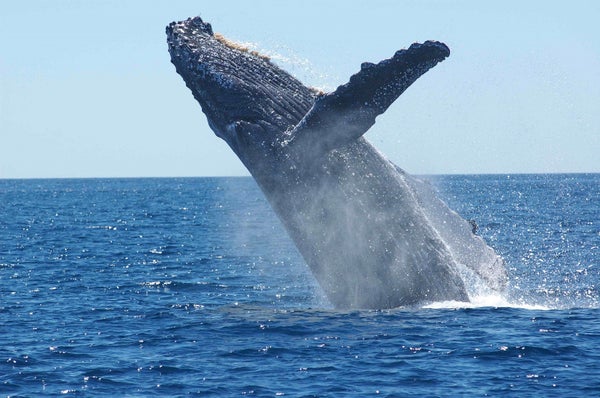關於支援科學新聞業
如果您喜歡這篇文章,請考慮透過以下方式支援我們屢獲殊榮的新聞業 訂閱。透過購買訂閱,您正在幫助確保有關塑造我們當今世界的發現和想法的有影響力的故事的未來。
當雄性座頭鯨訪問它們的繁殖地時,它們不會在沉默中游泳。相反,它們唱歌。它們所唱的曲調取決於它們居住的地方:同一個海盆內的種群唱相似的歌曲,但不同海盆的種群通常唱不同的歌曲。然而,一個種群中的所有雄性都產生相同的歌曲,這種歌曲會隨著時間而變化。先前對鯨歌的研究表明,這種變化發生在進化尺度上——也就是說,是逐漸發生的。但在本週的《自然》雜誌上,研究人員描述了澳大利亞東海岸外太平洋鯨魚種群中革命性的歌曲變化。他們報告說,這種轉變的激進性質“在動物文化聲音傳統中是前所未有的,並表明新奇事物可能會刺激座頭鯨歌曲的變化”。
悉尼大學的邁克爾·J·諾德和他的同事在1995年至1998年期間的遷徙過程中,竊聽了昆士蘭州東南部海岸外的鯨魚,分析了1057小時的歌曲。(唱歌據推測是一種性炫耀的形式,但雄性是在向雌性求愛還是警告其他雄性遠離尚不清楚。)在頭兩年,該團隊檢測到曲調的適度進化變化,但他們注意到有兩隻鯨魚在唱完全不同的歌曲。1997年,更多的鯨魚學會了新歌——大多數鯨魚唱的是新歌或老歌,但少數鯨魚製作了包含兩種型別主題的中間版本。到1998年,研究人員只聽到了新歌。有趣的是,這首歌與1996年沿著澳大利亞西海岸遷徙的座頭鯨的歌曲幾乎完全相同。因此,該團隊得出結論,來自西海岸種群的一小部分歌手一定加入了東海岸種群,並將他們朗朗上口的西海岸小調帶到了那裡。
